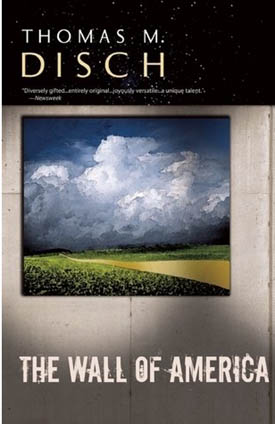 Thomas M. Disch was one of the more challenging of the American New Wave science-fiction writers. Where writers such as Roger Zelazny and Samuel R. Delany were pushing the boundaries of the formally acceptable in science fiction (and fantasy, for that matter), Disch was turning the conceptual universe upside down with novels such as Camp Concentration and 334. It’s also worth noting that he was a respected poet and literary critic (among other things), and those disciplines find echoes in his fiction.
Thomas M. Disch was one of the more challenging of the American New Wave science-fiction writers. Where writers such as Roger Zelazny and Samuel R. Delany were pushing the boundaries of the formally acceptable in science fiction (and fantasy, for that matter), Disch was turning the conceptual universe upside down with novels such as Camp Concentration and 334. It’s also worth noting that he was a respected poet and literary critic (among other things), and those disciplines find echoes in his fiction.
The Wall of America is a collection of Disch’s short fiction, running the gamut from a mystifyingly surreal fantasy about two stuffed animals that may really be about an autistic child (“The Owl and the Pussycat”) to a mordant and scathing look at the publishing industry and its attendant media circus (“The Abduction of Bunny Steiner, or, A Shameless Lie” — a story which, incidentally, is not kind to literary agents or editors).
Disch is not prone to explain things to the reader, sometimes leaving us scratching our heads, as in “The Wall of America,” in which, through the wonders of modern building technology, America has built a plywood wall along the Canadian border — which the NEA makes available as gallery space to artists. (The Canadians like the Wall — it keeps the Yanks out.) Lester’s space is in North Dakota, and he manages sometimes actually to sell his paintings, although he sort of fell into painting by accident — or actually, because of an accident, which caused him to spend several months in rehab, where they insisted he had to have a hobby. It serves to keep him away from his wife and children, at least for a couple of months a year, and the occasional sale is gravy. And then one night he meets a kid named Gulliver who’s touring the Wall in a Hummer. Gulliver offers Lester a beer, and they start talking, the way people will when there’s not much else to do and no one else to deal with. The story finishes with the paintings on the Wall, left there through the turn of the seasons for a couple of years by story’s end, because Lester is gone. We don’t know where, we don’t know why, and somehow, it’s not all that important.
A lot of these stories are like that, no matter how much “science fiction” Disch has built into the milieu, as in “Ringtime,” in which memory has become an art form. The story is told by an artist named Whelan whose career has tanked, and who, while breaking into an art gallery, is apprehended by the owners. And once again, not much happens. Except that a lot does.
Call it a function of Disch’s ability as a writer. The man’s prose is magical, lean, strong, and often simply mesmerizing: Disch was capable of pulling his readers into a story and keeping them there, seemingly without effort. The amazing thing is that the writing is concrete, but I think, as is so often the case in poetry, that only serves to make the resonances more acute. The ideas, on the other hand, often seem outré to the point of being scary, but they’re not, really: they are things that happen all the time, thoughts we think all the time, experiences we’ve all had, thrown into sharp relief. There’s an analytical mind at work here, and the results of that activity are sometimes distinctly discomforting, but only in retrospect — this stuff goes down real easy.
There’s also an undercurrent of anger that runs through this collection. Disch was, as far as I know, the first science-fiction writer to come out as gay, in 1968, and I think that has bearing here. For men of our generation (he was only a few years younger than I), that’s part of the arsenal: ours was the Stonewall generation, the generation that got right up the noses of the American Psychiatric Association and the American Psychological Association about the whole “mental illness” thing, the generation that decided it had finally had enough of being marginalized by a blinkered, hypocritical society, and we were good and thoroughly pissed off. It’s not a bitter kind of anger, though — it’s a raucous, Mardi Gras type of in-your-face truculence that supports these stories and provides a lot of their energy.
I came to Disch’s work late, somehow, and it’s a shame he’s no longer with us — he committed suicide on July 4, 2008. My advice on this one is take these stories in small doses — they can leave you gasping. But read them, and then start looking for anything else you can find by Thomas M.Disch.
(Tachyon Publications, 2008)
